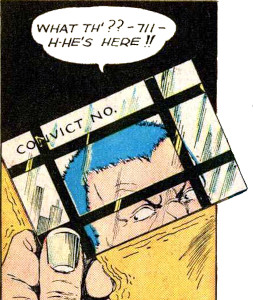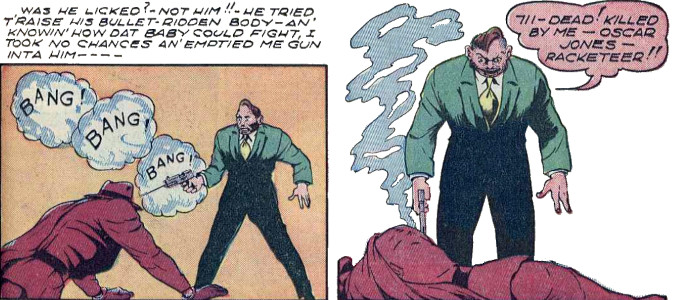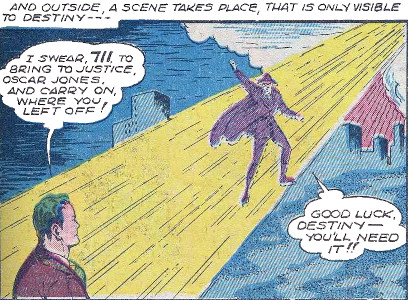 Real Name:
Daniel Dyce
Real Name:
Daniel Dyce 711
 Real Name:
Daniel Dyce
Real Name:
Daniel Dyce
Identity/Class: Normal human
Occupation: Convict, prison trustee;
formerly District Attorney
Group Membership:
Affiliations: Jacob Horn (deceased), Westmoor Prison's warden
Enemies: "Slick" Panzer, Looie Lutz, "Rock" Gatty, Spike, "Boots" Carver, "Big Boy" Bern, "Drippy" Drew, "Butcher" Bowes, "Bat" Barron, Carl, Yoki, Karp, the Runt, Carl von Spunk, Fritz, Bizone, Screw, "Goon" McGirk, Oscar Jones, the Brick Bat
Known Relatives: None
Aliases: Jacob Horn
Base of Operations: Westmoor Prison
First Appearance: Police Comics #1 (Quality Comics, August 1941)
Powers/Abilities: 711 was quick-witted and an exceptional hand-to-hand fighter.
 Height: Unrevealed - he's tall, well above average, so
perhaps 6' plus
Height: Unrevealed - he's tall, well above average, so
perhaps 6' plus
Weight: Unrevealed - muscular, so above average without being
overweight
Eyes: Unrevealed
Hair: Black
Summary: Daniel Dyce was a kind hearted District Attorney, who bore an uncanny resemblance to his friend Jacob Horn. Horn was about to go into custody awaiting trial, but desperately wanted to see his wife give birth, so Dan agreed to swap places with him temporarily. However Jacob was killed on the way to the hospital, struck by a car, while Dan, in his place, was convicted and sentenced to life in Westmoor Prison as prisoner #711. Unable to prove his true identity, Dan took two years to tunnel his way out, but (bizarrely) chose to return to his cell instead of his old life, escaping each night to fight crime and leaving calling cards - small mirrors with bars drawn on them so the villains would see themselves behind bars when they picked them up - so his foes would know he was after them. After several months of living like this, he was killed by mobster Oscar Jones during a gun battle. The hero Destiny sensed the crime, and made his crimefighting debut at the scene of 711's demise.
History:
Comments: Created by George E. Brenner.
Dyce switches back and forth in the stories between being called 711 and #711 - the former is his crimefighting alter ego, and the latter his subtly different prisoner I.D, though of course the lines of the # also mimic prison bars. And no, younger readers, that wouldn't mean he's being called "hashtag 711" because no one called # a hashtag back in the 1940s. Nor was he being called "octothorpe 711" (octothorpe being the more proper name for that symbol), because that term wasn't coined until the late 1960s. In this context if someone was saying it out loud, it'd probably be "number 711".
In case anyone reading this thinks "why did George Brenner name his crimefighter after a convenience store chain?", the 7-Eleven stores didn't adopt that name until 1947, so the comic character was using this numerical moniker first.
 There are some moments in his origin story that make you go "hmm."
Firstly, Dyce learns of Horn's death in a hit and run because it is
reported in a newspaper - let that sink in for a second, the newspaper
identifies Jacob Horn by name, stating he died while on the way to see his
wife and newborn son. That means he had to be positively identified, so
Dyce has a way to prove he isn't Jacob Horn, and should thus be able to
arrange his release. Secondly, after spending two years digging a tunnel
out of prison Dyce decides he must have been forgotten by now and decides
to remain inside. Why? I mean, I understand that the writer wanted to give
#711 a memorable schtick to make him stand out from the other costumed
crimefighters of that era, but seriously this makes little sense. He could
have reclaimed his old life, telling anyone who cared that he was just
back from living abroad, and continued to fight crime just as easily, if
not more so, no longer having to exit via tunnel each night, nor running
the risk of being given an inconvenient cellmate or being missed if the
guards ever did a head count, and not having to curtail his crimefighting
activities each morning in order to race back to prison before his escape
was noticed. And all of that is without the day to day risk of living
alongside hundreds of violent felons. I can only assume he'd become
institutionalized and simply didn't want to live outside of prison
anymore.
There are some moments in his origin story that make you go "hmm."
Firstly, Dyce learns of Horn's death in a hit and run because it is
reported in a newspaper - let that sink in for a second, the newspaper
identifies Jacob Horn by name, stating he died while on the way to see his
wife and newborn son. That means he had to be positively identified, so
Dyce has a way to prove he isn't Jacob Horn, and should thus be able to
arrange his release. Secondly, after spending two years digging a tunnel
out of prison Dyce decides he must have been forgotten by now and decides
to remain inside. Why? I mean, I understand that the writer wanted to give
#711 a memorable schtick to make him stand out from the other costumed
crimefighters of that era, but seriously this makes little sense. He could
have reclaimed his old life, telling anyone who cared that he was just
back from living abroad, and continued to fight crime just as easily, if
not more so, no longer having to exit via tunnel each night, nor running
the risk of being given an inconvenient cellmate or being missed if the
guards ever did a head count, and not having to curtail his crimefighting
activities each morning in order to race back to prison before his escape
was noticed. And all of that is without the day to day risk of living
alongside hundreds of violent felons. I can only assume he'd become
institutionalized and simply didn't want to live outside of prison
anymore.
 Presumably because the writer simply forgot that everyone was supposed to
believe Dan Dyce was Jacob Horn, by 711's third appearance the prison
warden is calling him Dan, not Jacob or Jake - so much for not being able
to prove his real identity.
Presumably because the writer simply forgot that everyone was supposed to
believe Dan Dyce was Jacob Horn, by 711's third appearance the prison
warden is calling him Dan, not Jacob or Jake - so much for not being able
to prove his real identity.
Appearance checklist (not including reprints): Police Comics#1-16
CLARIFICATIONS: 711 should not be confused with:
First Posted: Circa 05/11/2003
Last updated: 12/11/2022
Any Additions/Corrections? Please let me know.
All images and characters depicted on this site are copyright their respective holders, and are used for informational purposes only. No infringement is intended and copyrights remain at source.